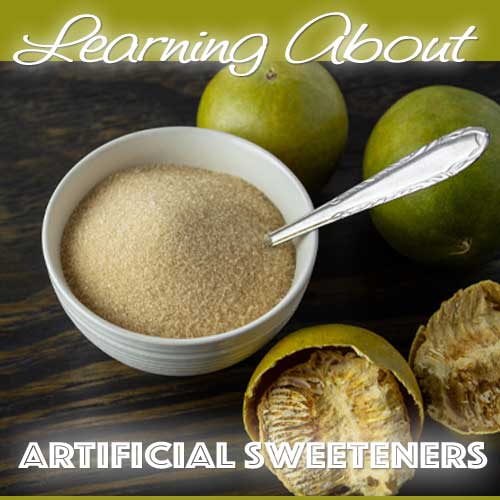I was recently watching TV and a commercial came on that said that artificial sweeteners caused strokes. I don’t eat foods with artificial sweeteners because they cause my GERD to flare up but I was curious and thought it was time for me to be learning about artificial sweeteners. Food and beverages with sugar in them give us empty calories that add up and cause weight gain. They also raise the risk of of health problems like diabetes and heart disease. Whether you are eating white sugar, honey, molasses or organic sugars, they are all sugar and they all lead to the same result. For this reason, many people look to sugar substitutes that offer less calories and some have no calories.
Types of Sugar
- Sugar (50% glucose, 50% fructose)
- Agave (10% glucose, 90% fructose)
- Honey (30% glucose, 40% fructose, 14% water & small amounts of vitamins & minerals)
- High Fructose Corn Syrup (45% glucose, 55% fructose)
- Rice or Brown Rice Syrup (3% glucose, 52% maltotriose, 45% maltose)
- Molasses
- Sugar Substitutes
Sugar is a simple carbohydrate that is naturally found in fruits, dairy, grains and some vegetables. Table sugar is a combination of two simple carbs: glucose and fructose. Glucose is metabolized by our cells for energy. Fructose is metabolized by our liver which promotes fat. The FDA calls Sugar Substitutes Non-Nutritive Sweeteners because they are high-intensity, low-calorie, artificial sweeteners that provide no nutritional benefits such as vitamins and minerals.
Names of Sugar Substitutes Allowed by the FDA in the United States:
- Acesulfame potassium (Sweet One, Sunett)
- Advantage
- Aspartame (NutraSweet, Equal)
- Neotame (Newtame)
- Saccharin (Sweet’N Low)
- Luo han gul (Monk Fruit in the Raw)
- Purified stevia leaf extracts (Truvia, PureVia, others).
- Sugar alcohols (sorbitlol, xylitol, mannitol, others)
What are the dangers of artificial sweeteners?
- If you have Phenylketonuria (PKU), consuming aspartame can lead to serious heath problems.
- If you have a bowel disease sugar substitutes can cause flares.
- Children under that age of 2 years old should not have sugar substitutes.
Are there benefits of using artificial sweeteners?
- Possible lowered risk of tooth decay and cavities.
- Sugar substitues do not raise blood sugar levels.
What are side effects of artificial sweeteners?
Long-term daily use of artificial sweeteners suggest a link to higher risk to stroke, heart disease and death overall. But this could also be linked to healthy habits that people don’t do, like eating a healthy diet and getting regular exercise and preventative medical checkups that might bring people to this higher risk of death.
Saccharin negatively affects the good bacteria in our small intestine and gut after long-term use.
Sugar alcohols, which are often found in processed foods like gum or candy, can increase the risk for cardiac events. More studies need to be done but it seems to be causing a stickiness to the the platelets in the blood of those that regularly ingest it. Platelets help our blood to clot if we cut ourselves. If platelets are sticky than the risk of blood clots increase and this raises the risk of of heart attack, stroke or other vascular issues.
There are research findings that long-term use of sugar substitutes that show that they effect the gut biome in a negative way. The way that our gut and our brain communicate and create more cravings for sweets, the way people feel hunger and how our bodies manages sugar.
What are the safest artificial sweeteners to use?
The Food and Drug Administration considers Stevia (Truvia and PurVia), monk fruit and allulose to be Generally Recognized and Safe (GRAS) for use as NNSs.
Overall, artificial sweeteners are not meant for every day use; they are sweeter than actual sugar and effect our bodies cravings and desire for food. It is best to use moderation. A diet rich in fresh fruits and vegetables is the best mix of nutrients for our bodies. Snacks labeled with low sugar or no sugar are not the most nutritious choice. Processed foods are not our friend.
Water infused with lemon, lime or other fresh fruit, if you are bored with plain water, is the best choice to quench your thirst. And don’t forget to go to your doctor appointments!
~
If you are needing help creating a Wellness Plan that works for you, please Contact Wellness Works NW at 360-447-8061. Karen G Clemenson is a very caring and authentic person and she is looking forward to talking with you and helping you define your Wellness Goals and strategies. I hope this article answered questions you had and was easy to understand. If you would like us to write about a particular topic that you can’t find on this site, please send us an email on our Dear Jamie page and someone from Our Team will be glad to research and write about your topic.
Read More:
- Artificial sweeteners and other sugar substitutes by Mayo Clinic Staff, January 10, 2023
- Brown Rice Syrup: Good or Bad? by Kris Gunnars, BSc, Updated January 28, 2019
- Types of Sweeteners – Are Some Better Than Others? by The University of New Hampshire, October 2, 2023
- Mayo Clinic Q and A: Is erythritol an sew and healthy sugar substitute? Answered by Jennifer Drost, P.A. and Dawn Mussallem, D.O., Integrative Medicine and Health, Lifestyle Medicine, Mayo Clinic, Arizona and Jacksonville, Florida, September 19, 2023
- Non-Nutritive Sweeteners (Artificial Sweeteners) by American Heart Association editorial staff and reviewed by science and medicine advisors. Last review April 16, 2018
- What is Honey? By Kris Solid, RD for Food Insight, December 23, 2020
Related Articles
I hope this article helps Fuel Your Wellness. Please leave your comments below.
 Summer D Clemenson is a co-owner Clemenson Enterprises, LLC and Wellness Works NW. Summer her wife, Karen G Clemenson’s personal motto is Creativity, Honesty & Positivity are a must! This mantra helps them stay community and wellness minded in all they do. Summer is an Independent Wellness Advocate at dōTERRA. Summer also writes poetry and inspirational blogs @ GoodTimesAlways.com.
Summer D Clemenson is a co-owner Clemenson Enterprises, LLC and Wellness Works NW. Summer her wife, Karen G Clemenson’s personal motto is Creativity, Honesty & Positivity are a must! This mantra helps them stay community and wellness minded in all they do. Summer is an Independent Wellness Advocate at dōTERRA. Summer also writes poetry and inspirational blogs @ GoodTimesAlways.com.
~













